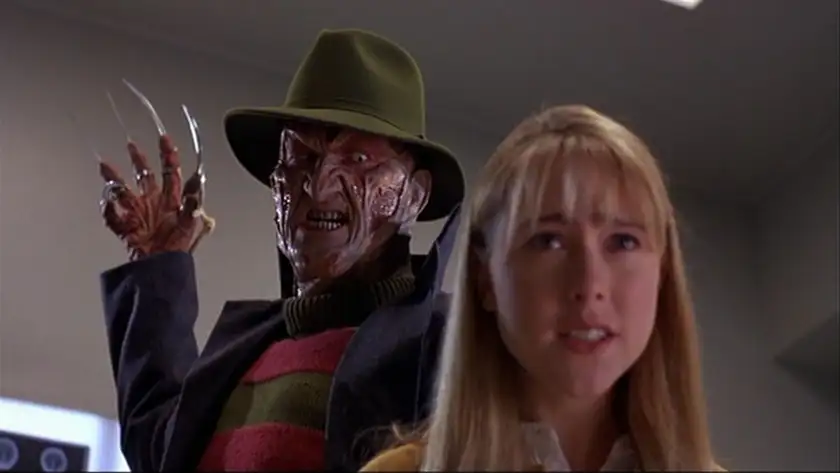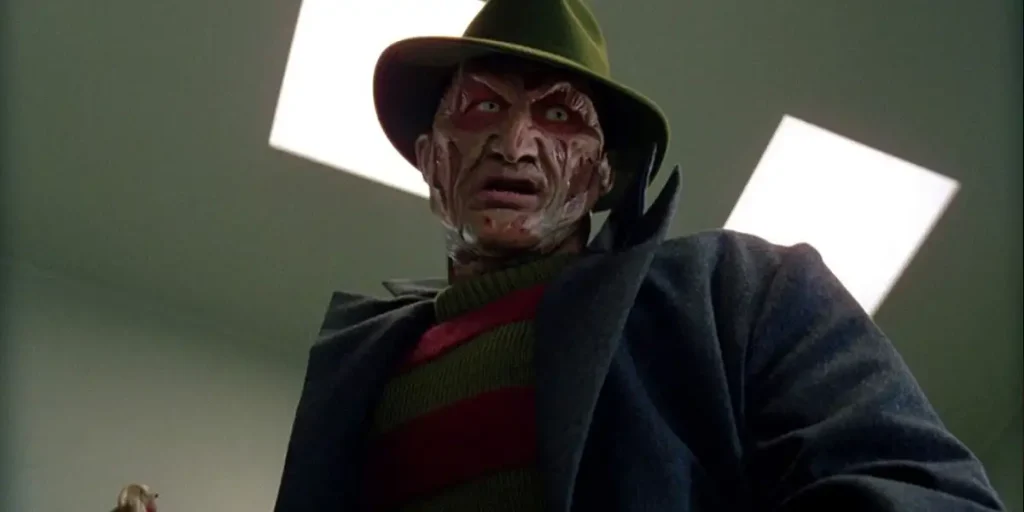Wes Craven’s New Nightmare provides compelling commentary about franchises and good psychological horror, but stumbles on the finish line with its campier finale.
There are two scares involving tongues in this movie. The implications of what that might mean about the director’s imagination will certainly give me a New Nightmare…
Director: Wes Craven
Genre: Horror, Psychological Horror, Supernatural, Slasher
Run Time: 112′
U.S. Release: October 14, 1994
U.K. Release: January 6, 1995
Where to Watch: Digital & VOD
Wes Craven’s New Nightmare is the seventh installment in the A Nightmare on Elm Street franchise. However, whereas the previous films followed the dream-manipulating slasher Freddy Krueger (Robert Englund, of Nightworld), New Nightmare is set in the real world with actress Heather Langenkamp (Hellraiser: Judgement) playing herself, and Miko Hughes (Pet Sematary) as her son Dylan.
After her role as Nancy in the A Nightmare on Elm Street films, Heather starts having a series of strange occurrences, such as creepy phone calls, nightmares, and her son speaking of Freddy Krueger coming up out of his bed.
A Nightmare on Elm Street is a franchise that started off with an interesting premise. A slasher that haunts you through your dreams connects directly with the primal fear we have of night and the dark. Yet, like many horror movie franchises, it has been dragged out over and over with multiple sequels that ended up diluting the lore and making its main villain Freddy Krueger into more of a late night talk show host than an actual menacing villain. Finally, the original film’s director Wes Craven returned, intending to bring the series back to its scarier roots with New Nightmare.
When you consider that backstory, the metafiction setup of New Nightmare works perfectly. Heather being haunted by the film and by Freddy is the perfect parallel for actors who are remembered only for their one super popular franchise or role. It can even bleed into their personal life as well, which mirrors how Heather is stalked by a phone caller quoting Freddy to her. And the fact that Freddy has broken free of the movies because audiences have gotten too used to the story is a direct allegory to how movie franchises get overplayed over time.

Those themes aren’t at the forefront of the film, but they do give it an additional interesting layer and also allow it to feel fresh, even seven movies into the franchise. What also helps is that New Nightmare on its own is already a compelling psychological thriller. The film actually plays it pretty ambiguous with whether Freddy’s actually invading the real world or if it’s just Heather’s paranoia getting the better of her. Even some instances of Freddy’s initial appearances are in situations that could be explained as dreams or hallucinations. This creates a unique sense of unease throughout the movie.
The film can also be pretty scary from time to time thanks to its restraint and pacing. Because Heather – and by extension, the audience – cannot be sure whether Freddy is really out there, the scares come sparingly, and the slower moments make the louder scares work. For instance, there’s a scene where Dylan is sleepwalking and he ends up jumping his mother with a makeshift Freddy’s claw glove. It should be silly since he’s a little kid, but the buildup to that moment in the night with him chanting lines from the movie actually makes it pretty harrowing to watch.
Langenkamp’s performance holds that tension together. Playing herself in a story has to be a bizarre situation, but she sells both the role of a star tired of her iconic franchise and that of a loving mother. Her commitment to Dylan makes it very easy to root for her to survive; after all, you’d have to be more heartless than Hollywood executives to want to see a mother and son get killed off. This is a bit dampened by the fact that Hughes feels like he’s literally sleepwalking for his performance, but he was a kid actor at the time, so I won’t grudge too much.
Up until the finale, this movie had me sold. I liked the characters, Freddy was portrayed in a creepy, more subdued manner, and the focus on Heather’s deteriorating mental state added realism to the whole situation. Unfortunately, the final thirty minutes of the film end up derailing the experience. For one, the CGI and green screen are far too noticeable, especially in some larger scale shots. But the bigger issue is with Freddy when he eventually comes to the forefront. (Spoiler warning for the next three paragraphs)
I am not inherently against Freddy being revealed to be real. I personally would have liked it if things had been left ambiguous even to the end, but choosing one stance doesn’t immediately invalidate the tension that was set up before. What does invalidate that tension is a complete tonal shift in how Freddy is handled. When I see his gigantic image appear in the clouds (complete with the aforementioned adobe-level effects) and cackle madly while toying with Dylan, I am more amused than horrified. I have the same reaction when he suddenly decides to take a leaf out of a frog’s book and extend his tongue to wrap it around Heather. I don’t want to hide under my blanket; I want to call 911 for sexual harassment.
The final confrontation also makes Freddy feel rather underwhelming. He is supposed to be the master of dreams, where nightmares are his reality. Yet in terms of actual powers, he is deterred far too easily with stabbing or punching. Perhaps he’s just toying with Heather and Dylan, but when I see Freddy straining to fit through a door to grab Dylan, I can’t help but wonder why I’m supposed to be scared of this guy.
Again, a nightmare standoff against Freddy wouldn’t have been a bad way to wrap up the movie if it had kept the subdued atmosphere. But it becomes an issue when the finale is so campy and silly compared to the far more grounded buildup. It makes that buildup feel pointless and the climax unsatisfying, giving you the worst of both worlds.
I can appreciate Wes Craven for trying his hand with the series one last time with New Nightmare. I like many of the ideas he presents, and I think there was genuine potential for a meta narrative that didn’t feel forced and also worked as a plain scary movie. But ironically, the shift into a campier, more action-focused direction similar to that of the previous sequels turns out to be this movie’s downfall as well. In the end, this film won’t awaken any old or new nightmares.
Wes Craven’s New Nightmare: Movie Plot & Recap
Synopsis:
Heather Langenkamp, many years after her role in the A Nightmare on Elm Street franchise, is haunted by mysterious occurrences that harken back to Freddy Krueger from the film series.
Pros:
- Character relationships are likeable and believable
- Tense, real psychological horror up till the end
Cons:
- Shoddy effects
- Finale clashes tonally with what was set up prior
Wes Craven’s New Nightmare is now available to watch on digital and on demand.
Loud and Clear Reviews has an affiliate partnership with Apple, so we receive a share of the revenue from your purchase or streaming of the films when you click on some of the links on this page. This won’t affect how much you pay for them and helps us keep the site free for everyone.

